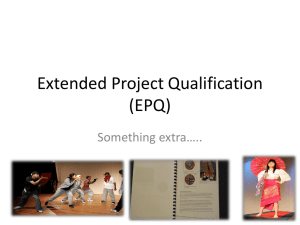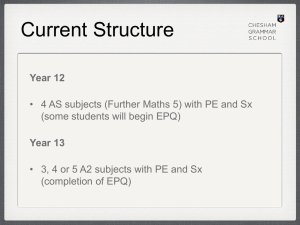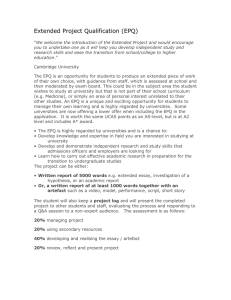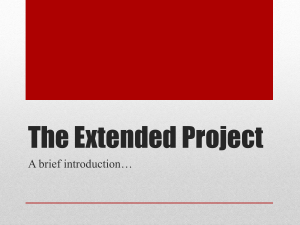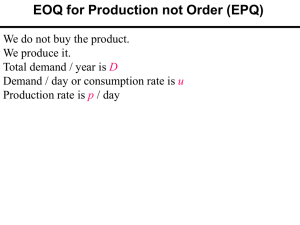Extended Project Qualification - Briefing Document
advertisement
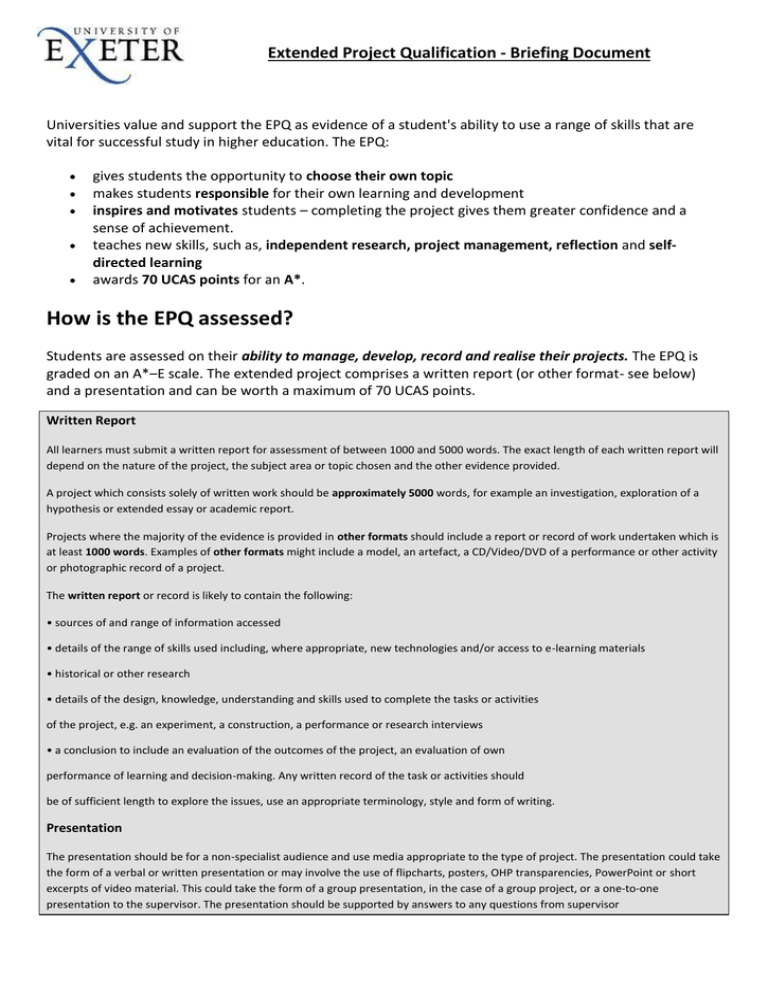
Extended Project Qualification - Briefing Document Universities value and support the EPQ as evidence of a student's ability to use a range of skills that are vital for successful study in higher education. The EPQ: gives students the opportunity to choose their own topic makes students responsible for their own learning and development inspires and motivates students – completing the project gives them greater confidence and a sense of achievement. teaches new skills, such as, independent research, project management, reflection and selfdirected learning awards 70 UCAS points for an A*. How is the EPQ assessed? Students are assessed on their ability to manage, develop, record and realise their projects. The EPQ is graded on an A*–E scale. The extended project comprises a written report (or other format- see below) and a presentation and can be worth a maximum of 70 UCAS points. Written Report All learners must submit a written report for assessment of between 1000 and 5000 words. The exact length of each written report will depend on the nature of the project, the subject area or topic chosen and the other evidence provided. A project which consists solely of written work should be approximately 5000 words, for example an investigation, exploration of a hypothesis or extended essay or academic report. Projects where the majority of the evidence is provided in other formats should include a report or record of work undertaken which is at least 1000 words. Examples of other formats might include a model, an artefact, a CD/Video/DVD of a performance or other activity or photographic record of a project. The written report or record is likely to contain the following: • sources of and range of information accessed • details of the range of skills used including, where appropriate, new technologies and/or access to e-learning materials • historical or other research • details of the design, knowledge, understanding and skills used to complete the tasks or activities of the project, e.g. an experiment, a construction, a performance or research interviews • a conclusion to include an evaluation of the outcomes of the project, an evaluation of own performance of learning and decision-making. Any written record of the task or activities should be of sufficient length to explore the issues, use an appropriate terminology, style and form of writing. Presentation The presentation should be for a non-specialist audience and use media appropriate to the type of project. The presentation could take the form of a verbal or written presentation or may involve the use of flipcharts, posters, OHP transparencies, PowerPoint or short excerpts of video material. This could take the form of a group presentation, in the case of a group project, or a one-to-one presentation to the supervisor. The presentation should be supported by answers to any questions from supervisor Session Plans The Project – developing project ideas/titles, gaining feedback from peers and ambassadors Research methodologies – different research techniques & utilisation, applying this to own project; plagiarism & referencing Planning your project - time planning & prioritisation; applying a time frame to your own project Presentation skills – assist students with the process of preparing and delivering a presentation EPQ Briefing Checklist You may need one or more of these depending on which sessions you are briefing for Generic List of Ambassadors/telephone numbers PowerPoint handout (with notes) EPQ session plan School specific briefing document Evaluation (1-5 or longer for fuller day) Session 1 – The project EPQ Briefing document Example project title questions Example projects (ambassadors/own) Session 2 - Research Methodologies Research log Evaluating websites handout Example projects (ambassadors/own) Session 3 Time Management handout Misc Room bookings other handout e.g. Library leaflet
